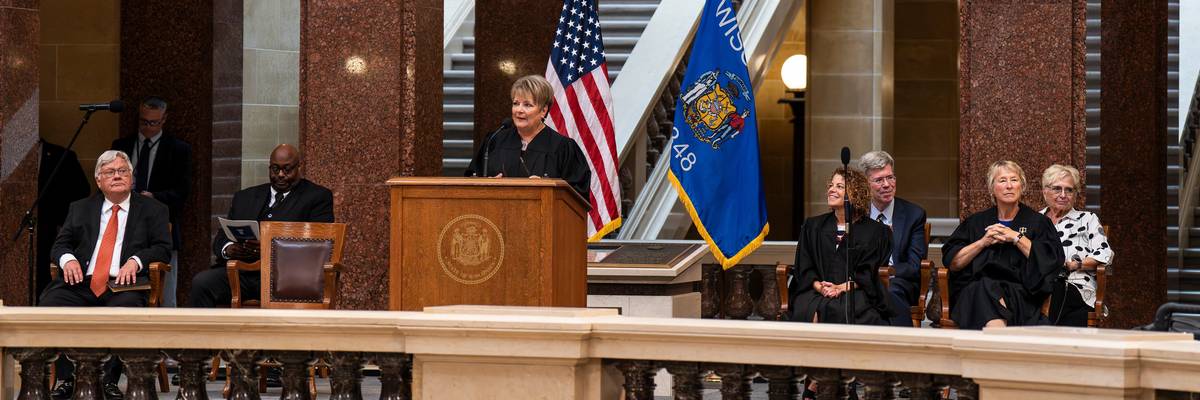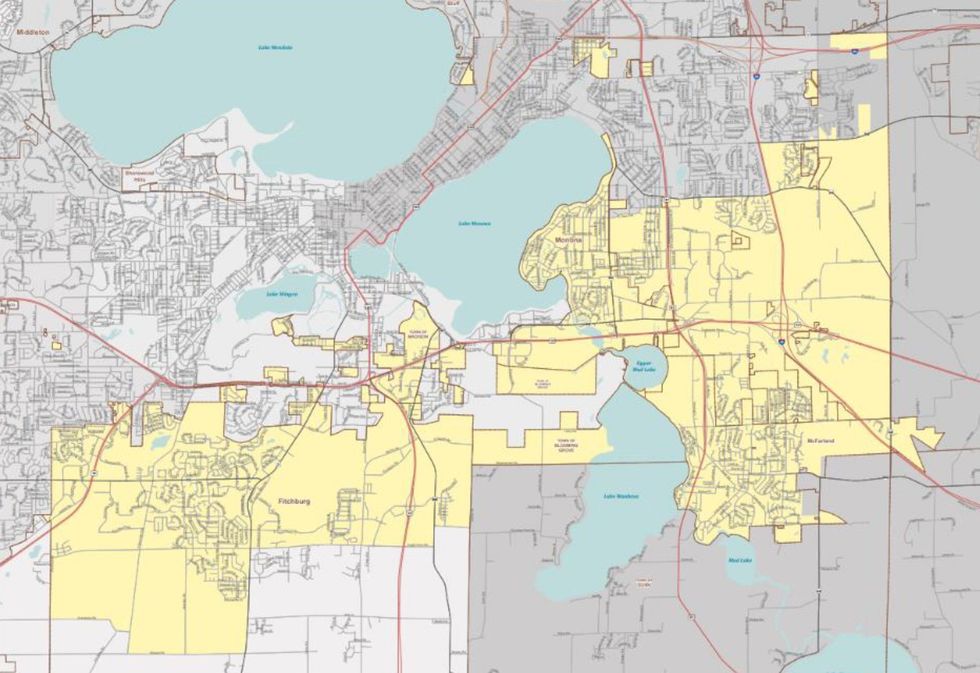

SUBSCRIBE TO OUR FREE NEWSLETTER
Daily news & progressive opinion—funded by the people, not the corporations—delivered straight to your inbox.
5
#000000
#FFFFFF
To donate by check, phone, or other method, see our More Ways to Give page.


Daily news & progressive opinion—funded by the people, not the corporations—delivered straight to your inbox.

Wisconsin Supreme Court Justice Janet Protasiewicz speaks during her swearing-in ceremony in the State Capitol in Madison on August 1, 2023.
Voting rights advocate Marc Elias hailed the ruling as "a huge win for democracy."
The Wisconsin Supreme Court on Friday ruled that the state's Republican-gerrymandered state legislative maps are unconstitutional and must be redrawn before the 2024 elections.
Justice Jill J. Karofsky wrote for the court's 4-3 majority that the current maps violate a constitutional provision "that Wisconsin's state legislative districts must be composed of physically adjoining territory."
The ruling only applies to Wisconsin's state Assembly and Senate maps, not its congressional map.
"Given the language in the Constitution, the question before us is straightforward," Karofsky wrote. "When legislative districts are composed of separate, detached parts, do they consist of 'contiguous territory'? We conclude that they do not."
Justice Janet Protasiewicz—whose election earlier this year gave the court a liberal majority—voted with the majority. This was expected, as Protasiewicz made gerrymandering a key campaign issue and slammed the GOP-drawn maps as "rigged" and "unfair."
Brought by Campaign Legal Center (CLC), Law Forward, the Election Law Clinic at Harvard Law School, Stafford Rosenbaum LLP, and Arnold & Porter, the lawsuit argued that "Wisconsin's current legislative districts are unconstitutional in multiple ways" that deliberately split Democratic voters in mid-sized cities and towns, giving Republicans an illegal electoral edge.

Friday's ruling states:
At least 50 of 99 Assembly districts and at least 20 of 33 Senate districts include separate, detached territory. A particularly stark example is the Madison-area 47th Assembly District... This district contains more than a dozen separate, detached parts that are home to thousands of people who must cross one or more other districts before reaching another part of the 47th.
Indigenous people are among those intentionally divided by Wisconsin's maps.
"Although my people have been on this land for thousands of years, we continue to fight for fair and equal access to the ballot," Anne Egan-Waukau, an enrolled member of the Menominee Nation, wrote for the Milwaukee Journal Sentinel. "We have faced significant barriers to voter access, from misinformation to restrictive voter identification laws, and most recently, gerrymandering."
"Our current legislative maps are among the most skewed in the country, and have specifically divided tribal communities across districts, depriving our people of fair representation," she added.
Dan Lenz, a lawyer for the petitioners in the case,
told The New York Times that the ruling is "a victory for a representative democracy in the state of Wisconsin."
"For too long, right-wing interests have rigged the rules without any consequences," he said. "Gerrymandered maps have distorted the political landscape, stifling the voice of the voters."
Dear Common Dreams reader, The U.S. is on a fast track to authoritarianism like nothing I've ever seen. Meanwhile, corporate news outlets are utterly capitulating to Trump, twisting their coverage to avoid drawing his ire while lining up to stuff cash in his pockets. That's why I believe that Common Dreams is doing the best and most consequential reporting that we've ever done. Our small but mighty team is a progressive reporting powerhouse, covering the news every day that the corporate media never will. Our mission has always been simple: To inform. To inspire. And to ignite change for the common good. Now here's the key piece that I want all our readers to understand: None of this would be possible without your financial support. That's not just some fundraising cliche. It's the absolute and literal truth. We don't accept corporate advertising and never will. We don't have a paywall because we don't think people should be blocked from critical news based on their ability to pay. Everything we do is funded by the donations of readers like you. Will you donate now to help power the nonprofit, independent reporting of Common Dreams? Thank you for being a vital member of our community. Together, we can keep independent journalism alive when it’s needed most. - Craig Brown, Co-founder |
The Wisconsin Supreme Court on Friday ruled that the state's Republican-gerrymandered state legislative maps are unconstitutional and must be redrawn before the 2024 elections.
Justice Jill J. Karofsky wrote for the court's 4-3 majority that the current maps violate a constitutional provision "that Wisconsin's state legislative districts must be composed of physically adjoining territory."
The ruling only applies to Wisconsin's state Assembly and Senate maps, not its congressional map.
"Given the language in the Constitution, the question before us is straightforward," Karofsky wrote. "When legislative districts are composed of separate, detached parts, do they consist of 'contiguous territory'? We conclude that they do not."
Justice Janet Protasiewicz—whose election earlier this year gave the court a liberal majority—voted with the majority. This was expected, as Protasiewicz made gerrymandering a key campaign issue and slammed the GOP-drawn maps as "rigged" and "unfair."
Brought by Campaign Legal Center (CLC), Law Forward, the Election Law Clinic at Harvard Law School, Stafford Rosenbaum LLP, and Arnold & Porter, the lawsuit argued that "Wisconsin's current legislative districts are unconstitutional in multiple ways" that deliberately split Democratic voters in mid-sized cities and towns, giving Republicans an illegal electoral edge.

Friday's ruling states:
At least 50 of 99 Assembly districts and at least 20 of 33 Senate districts include separate, detached territory. A particularly stark example is the Madison-area 47th Assembly District... This district contains more than a dozen separate, detached parts that are home to thousands of people who must cross one or more other districts before reaching another part of the 47th.
Indigenous people are among those intentionally divided by Wisconsin's maps.
"Although my people have been on this land for thousands of years, we continue to fight for fair and equal access to the ballot," Anne Egan-Waukau, an enrolled member of the Menominee Nation, wrote for the Milwaukee Journal Sentinel. "We have faced significant barriers to voter access, from misinformation to restrictive voter identification laws, and most recently, gerrymandering."
"Our current legislative maps are among the most skewed in the country, and have specifically divided tribal communities across districts, depriving our people of fair representation," she added.
Dan Lenz, a lawyer for the petitioners in the case,
told The New York Times that the ruling is "a victory for a representative democracy in the state of Wisconsin."
"For too long, right-wing interests have rigged the rules without any consequences," he said. "Gerrymandered maps have distorted the political landscape, stifling the voice of the voters."
The Wisconsin Supreme Court on Friday ruled that the state's Republican-gerrymandered state legislative maps are unconstitutional and must be redrawn before the 2024 elections.
Justice Jill J. Karofsky wrote for the court's 4-3 majority that the current maps violate a constitutional provision "that Wisconsin's state legislative districts must be composed of physically adjoining territory."
The ruling only applies to Wisconsin's state Assembly and Senate maps, not its congressional map.
"Given the language in the Constitution, the question before us is straightforward," Karofsky wrote. "When legislative districts are composed of separate, detached parts, do they consist of 'contiguous territory'? We conclude that they do not."
Justice Janet Protasiewicz—whose election earlier this year gave the court a liberal majority—voted with the majority. This was expected, as Protasiewicz made gerrymandering a key campaign issue and slammed the GOP-drawn maps as "rigged" and "unfair."
Brought by Campaign Legal Center (CLC), Law Forward, the Election Law Clinic at Harvard Law School, Stafford Rosenbaum LLP, and Arnold & Porter, the lawsuit argued that "Wisconsin's current legislative districts are unconstitutional in multiple ways" that deliberately split Democratic voters in mid-sized cities and towns, giving Republicans an illegal electoral edge.

Friday's ruling states:
At least 50 of 99 Assembly districts and at least 20 of 33 Senate districts include separate, detached territory. A particularly stark example is the Madison-area 47th Assembly District... This district contains more than a dozen separate, detached parts that are home to thousands of people who must cross one or more other districts before reaching another part of the 47th.
Indigenous people are among those intentionally divided by Wisconsin's maps.
"Although my people have been on this land for thousands of years, we continue to fight for fair and equal access to the ballot," Anne Egan-Waukau, an enrolled member of the Menominee Nation, wrote for the Milwaukee Journal Sentinel. "We have faced significant barriers to voter access, from misinformation to restrictive voter identification laws, and most recently, gerrymandering."
"Our current legislative maps are among the most skewed in the country, and have specifically divided tribal communities across districts, depriving our people of fair representation," she added.
Dan Lenz, a lawyer for the petitioners in the case,
told The New York Times that the ruling is "a victory for a representative democracy in the state of Wisconsin."
"For too long, right-wing interests have rigged the rules without any consequences," he said. "Gerrymandered maps have distorted the political landscape, stifling the voice of the voters."